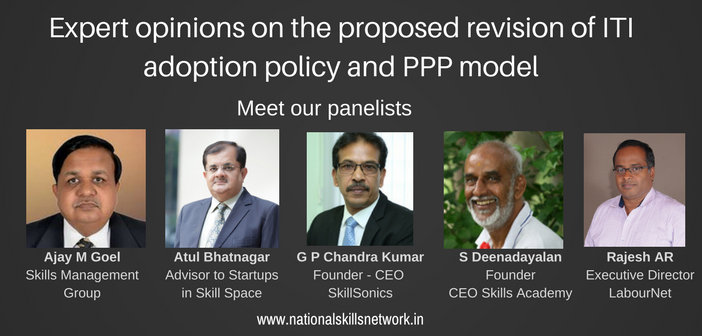The recent news report on the proposed revamp of ITI adoption policy and PPP models by Government of India has created quite a buzz in the Skill Space. Following the news report in one of the national dailies, we invited a panel of experts from the training industry, senior advisors and consultants in Skill Space to share their opinion and advice.
According to the news item, it was mentioned that the Center will soon revisit ITI adoption policy and review the performance of about 1200 ITIs being run by major manufacturing companies since 2007. Today, we have a total of 13000 ITIs and the adoption scheme has been welcomed by the industry since it had opened new avenues for PPP models.
Highlight of the existing scheme : 1396 ITIs were eligible for the scheme under which the industrial unit would get Rs. 2.5 crore interest-free loan for sprucing up the ITI infrastructure.
The news article reported that Dr K P Krishnan, Secretary, Ministry of Skill Development and Entrepreneurship (MSDE) is considering a revamp of the policy on the lines of decisions taken by the Government of Maharashtra. Though he acknowledged the need for private sector connect, he was of the opinion that “the tax payers may raise the issue and ask why government set up ITIs with huge capital investment but hand these over to private players. We definitely want industry connect but do not want to abdicate too. If they (industry) want to produce their own people, they can have their own set up…..” To read the complete story, click here.
 Our panel of experts went through the news item and shared their opinion. We present to you suggestions and advice from Ajay Mohan Goel, Co-Founder and Principal Consultant, Skills Management Group, Atul Bhatnagar, Advisor to Startups in Skill Space, G P Chandra Kumar, Founder Co-Chairman & CEO, SkillSonics, S Deenadayalan, Founder, CEO Skill Academy and Rajesh A R, Executive Director, LabourNet.
Our panel of experts went through the news item and shared their opinion. We present to you suggestions and advice from Ajay Mohan Goel, Co-Founder and Principal Consultant, Skills Management Group, Atul Bhatnagar, Advisor to Startups in Skill Space, G P Chandra Kumar, Founder Co-Chairman & CEO, SkillSonics, S Deenadayalan, Founder, CEO Skill Academy and Rajesh A R, Executive Director, LabourNet.
Ajay Mohan Goel, Co-Founder and Principal Consultant, Skills Management Group
I understand that the Ministry of Skill Development and Entrepreneurship has decided to review the policy wherein about 1200 ITIs have been adopted by industry players. One key issue raised has been of using tax payer’s money used for setting up it is and then handed over to private players.
 The purpose of this world bank funded scheme is to make ITIs more demand responsive. This scheme has been effective in pockets, where the industry partners are large and have put in managerial manpower to oversee the scheme. Maruti is one such example which has created a significant impact in over 40 ITIs adopted by them. Instead of throwing the baby with the bathwater, government must review the limited role provided for the Institute Management Committee (IMC) setup jointly with the private player.
The purpose of this world bank funded scheme is to make ITIs more demand responsive. This scheme has been effective in pockets, where the industry partners are large and have put in managerial manpower to oversee the scheme. Maruti is one such example which has created a significant impact in over 40 ITIs adopted by them. Instead of throwing the baby with the bathwater, government must review the limited role provided for the Institute Management Committee (IMC) setup jointly with the private player.
IMCs have been given limited advisory role, with some financial powers. They have no say in the recruitment of principals, instructors and development of curriculum, which is done by central / state government. Within these constraints many of the large and committed players are making a significant impact by bringing industry exposure and awareness among the instructors and students, making ITIs physical environment more professional, bringing know-how of latest and market needed technologies / processes, providing inputs beyond the curriculum for making students employable.
Also the argument that government ITIs have been handed over to the private players is misleading, as the complete control on the adopted ITI is of the government.
What is needed for the government is to review the scheme to make the industry connect deeper and impactful, weed out non-performing industry players and replace with serious manufacturing sector focussed organisations. It also needs to provide more autonomy for hiring of Principals, instructors and curriculum development.
Atul Bhatnagar, Advisor to Startups in Skill Space
 On a policy level, I would like private sector involvement to be crucial in developing an employable workforce in India and for abroad. So the government can’t cite the use of tax payers money for capital investment for private sector to be the reason for not allotting ITIs. The employers are in the private sector. They should be given the prerogative and provided support to develop the workforce in line with the rapid technology changes and market conditions. The government sector has still not opened to a recruitment criteria for considering skills compared to degrees for government jobs. They need to ‘walk the talk’ first for promoting employment of skilled people aligned to NSQF QP-NOS.
On a policy level, I would like private sector involvement to be crucial in developing an employable workforce in India and for abroad. So the government can’t cite the use of tax payers money for capital investment for private sector to be the reason for not allotting ITIs. The employers are in the private sector. They should be given the prerogative and provided support to develop the workforce in line with the rapid technology changes and market conditions. The government sector has still not opened to a recruitment criteria for considering skills compared to degrees for government jobs. They need to ‘walk the talk’ first for promoting employment of skilled people aligned to NSQF QP-NOS.
Apparently, in every sector, private players have demonstrated quality and consistency of outcomes. In the skill sector too, they may do a better job and adapt curriculum to market conditions compared to complement the government machinery. There can be a more robust criteria for choosing the private players for running ITIs. Maybe corporate houses should be given branding rights and responsibility for running ITIs in remote locations as part of their CSR.
We need faster turnarounds in curriculum and result-oriented processes that demonstrate efficiency. Private sector can make changes very fast and aren’t bound by the long and lengthy processes of bureaucratic nature.
G P Chandra Kumar Founder Co-Chairman & CEO, SkillSonics
 I’d like to see many improvements in ITI by adopting a mutually beneficial policy for industry, academia and larger community. This involves training of the teachers and trainers, technology upgradation, curriculum revamp and other ways of bringing ITIs up to meet the industry expectations. I would recommended that ITIs should be converted to Industrial Skill Institutes and cover all sectors. Some key points that need immediate redressal:
I’d like to see many improvements in ITI by adopting a mutually beneficial policy for industry, academia and larger community. This involves training of the teachers and trainers, technology upgradation, curriculum revamp and other ways of bringing ITIs up to meet the industry expectations. I would recommended that ITIs should be converted to Industrial Skill Institutes and cover all sectors. Some key points that need immediate redressal:
- Trainers are not industry-ready. There needs to be formal certification of trainers based on industry relevant parameters.
- In almost all the ITIs, equipment and raw material are sub standard and not adequate. These need to be upgraded to industry standard.
- The assessment methodology needs to be strengthened with industry standard projects; examiners need to be trained and certified.
- There’s a need to upgrade basic Infrastructure like Smart classrooms, internet facility and amenities need to be upgraded.
At the same time, we need to establish a highly interactive and productive industry-connect. This requires:
- Curricula should be based on NSQF QP-NOS and SSC definitions as they are created by the industry.
- Theory and practicals should be conducted by the ITI’s and production exposure should be done by companies.
- The production exposure for every course should be about 40% and should follow a defined curricula.
- Industry should contribute largely through production exposure
- Get industry to register an ITI student as an apprentice, when they join the course. They can choose to recruit the candidate, if needed at the end of the term.
When we establish this process, infrastructure will remain with ITIs, Apprenticeship intake remains with industry and responsibility to make them industry-ready through production exposure also rests with the industry.
S Deenadayalan, Founder, CEO Skill Academy
 This is like a catch 22 question. Industry can be the watchdog but totally delinking them is not right in my opinion I feel the government should benchmark some of the best institutions in the country and follow their practices.
This is like a catch 22 question. Industry can be the watchdog but totally delinking them is not right in my opinion I feel the government should benchmark some of the best institutions in the country and follow their practices.
The PPP model where the government has allocated 2.5 crores, has remained quite a non-starter with a handful of high-performing institutions. However, partnerships such as NTTF has with Maruti and Tatas have done exceedingly well. We need to understand why other partnership did not work. Other than technical training institutions like NTTF, MICO – Bosch training center, Don Bosco and Ramakrishna Mission ATI, we don’t have successful models to emulate. The government ITIs are in a pathetic condition. With the principals of these ITIs not being empowered through training, they are hardly connected with the industry. Unless you work on thought leadership, arbitrary structural changes don’t augur well for either the industry or the academia.
And the role of the industry should not end with providing infrastructure or latest tools to these ITIs, or providing hardware or software that often remains locked in the rooms, lying unused. The ITIprincipals should be trained on par with industry expectations in the current context, have frequent interactions with the industry and establish a two-way communication.
Instead of completely withdrawing the industry adoption policy, the government should study the root cause of the problem. Look at the way NTTF has made technical training aspirational, 80% of their students get international placements. Why do people flock to such institutions and not government ITIs? The quality of training and contextual employability are the key differentiating factors. Particularly, in millennial context, we need to work hard to make skills aspirational. The ambition and aspiration for an engineering degree will lead the youth nowhere with low levels of employment.
The government can focus on facilitating interaction with industry leaders like Ashok Leyland, TVS, Dr Reddys and so on to seek inputs for building aspirational value, syllabus redesign and other ways of conveying thought leadership by bringing principals in the fold of decision making. This a big challenge since the distance between policy makers and principals of ITIs has many hierarchical structures to wade through! If we don’t address this issue, the situation will worsen if the industry is unable to get skilled candidates.
Industry can be the watchdog but totally delinking them is not right in my opinion I feel they should benchmark some of the best institutions in the country and they should that model and there’s nothing like autonomy.
Rajesh A R, Executive Director, LabourNet
 I believe upgradation of the ITIs should be the responsibility of the industry with little interference from the principals of ITIs. I have two points to share in this regard:
I believe upgradation of the ITIs should be the responsibility of the industry with little interference from the principals of ITIs. I have two points to share in this regard:
One, the PPP model for developing ITIs in India has not worked as expected mainly due to the administrative and bureaucratic controls exercised by the staff unions, state/ central government intervention through ineffective principals of ITIs. And, the investments from the industry in improving ITIs have remained at cosmetic levels because it couldn’t penetrate at the level of modifying the curriculum to suit the industry requirements, hiring the teachers with expertise, or changing the teaching methodologies as per the latest technology and dynamic knowledge.
As a result, the industry- ITI collaboration, which could have been an ideal way to connect with the world of work gets scrutinized time and again. Even though industry has absorbed and hired the ITI students, they are not satisfied with the quality of the students. The guidelines for setting up the Institute Management Committee (IMC) are laid out but the actual execution of the functions as an industry partner is not clear. This gives rise to debates regarding inappropriate use of public funds and other clauses and conditions that hinder smooth execution of plans.
Two, if industry has to shoulder the responsibility of enhancing the outcomes and efficiency of ITIs, the government should support the process through disbursement of soft loans. This will facilitate the industry to adopt and run and ITI and show positive results through need and outcome based curriculum. A case in point is Flexi- MOU wherein multiple changes in the guidelines has made that scheme ineffective. This should not be repeated. Hopefully, dual system of training in ITI and National Apprenticeship Promotion Scheme (NAPS) would not follow suit. What we need now is less of administrative control and more collaboration with industry and its training partners to deliver industry-integrated training. This way, ITI teachers and ecosystem will stand to gain as they get exposed to the latest ways of imparting knowledge and skills as per industry standards.
Summing up
As we can see, all our panelists make a strong case for retaining the PPP models that strengthens the scope for industry connect with ITIs. Most of them recommend that the government should thoroughly study the present practices and loopholes vis-a-vis the best performing ITIs adopted by the industry, before taking any drastic decisions. This means, we need to explore more ways of productive and performance-oriented frameworks that may call for curriculum level reforms, improvement in teaching methodology, new avenues for apprenticeship and other industry-driven inputs that opens the right door rather than closing the existing ones.














